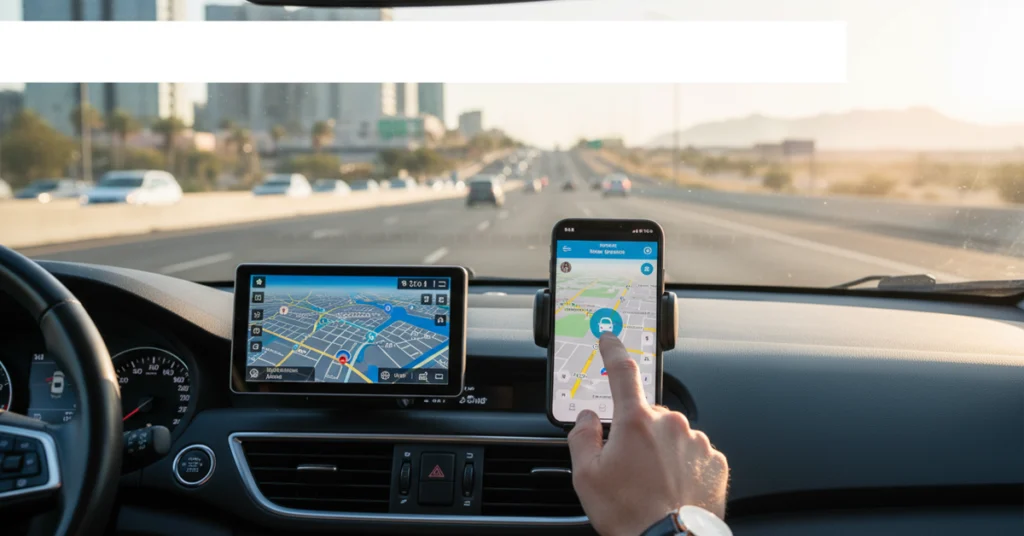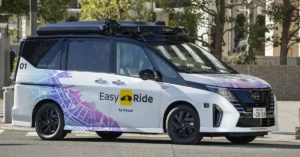Navigation has come a long way from folded paper maps and printed directions. Today, most drivers rely on digital tools to guide them safely and efficiently, whether commuting through busy city streets, cruising along highways, or exploring more remote areas. The real choice now lies between dedicated GPS devices and smartphone navigation apps. Each option offers unique advantages, and understanding these differences can help you make a choice that fits your driving habits, lifestyle, and safety priorities.
In the UAE, where traffic congestion, long desert drives, and urban navigation challenges are part of everyday life, selecting the right navigation solution can make a significant difference. The right tool can reduce stress, improve travel efficiency, and even enhance safety. This guide explores the benefits, limitations, and practical applications of both GPS devices and smartphone apps, offering actionable insights to make your journeys smoother, safer, and more enjoyable.
The Evolution of Navigation Technology
Navigation technology has transformed dramatically over the last few decades. Once limited to paper maps and printed directions, drivers now have access to real-time, satellite-guided systems that provide precision on demand. At the heart of this transformation are Global Navigation Satellite Systems, or GNSS, which include GPS, GLONASS, Galileo, and Beidou. These networks deliver highly accurate location and timing information essential for both dedicated GPS devices and smartphone navigation apps.
While both solutions rely on the same satellite systems, the way they deliver navigation, handle updates, and integrate with other features differs. Understanding this evolution allows drivers to appreciate the advantages and limitations of each option and make a choice that suits their driving environment, from congested city streets to long desert highways.
Advantages of Smartphone Navigation
Smartphone navigation apps such as Google Maps, Waze, and TomTom GO have become everyday tools for drivers around the world. They provide convenience, integration, and real-time information that can improve the driving experience.
Real-Time Updates
Smartphone apps constantly update with live traffic conditions, road closures, and alternative routes. In a city like Dubai, where traffic congestion can be unpredictable, having an app that reacts to real-time events can save significant time and reduce stress. Drivers can avoid accidents, construction zones, or peak-hour jams, making commuting far more efficient.
Integration with Other Apps
Smartphone navigation is not just about maps. Apps integrate seamlessly with music streaming services, voice assistants, and hands-free calling. This multifunctional integration allows drivers to control entertainment, communicate safely, and receive turn-by-turn directions, all from a single device.
High-Resolution Displays
Most modern smartphones offer sharper, brighter screens than standalone GPS devices. High-resolution displays make maps easier to read, and routes clearer, helping drivers focus on the road rather than squinting at the screen. This is particularly helpful when navigating complex urban intersections or multiple-lane highways in Abu Dhabi or Dubai.
Accessibility and Cost
Many navigation apps are free or available at minimal subscription costs, making them an accessible option for most drivers. Since most people already own a smartphone, these apps offer an economical solution for everyday navigation.
Advanced Innovations
Smartphones are increasingly incorporating advanced technologies like LiDAR and ultrasonic sensors to provide obstacle detection and real-time feedback. These innovations can improve safety for all drivers and even assist visually impaired users, offering greater independence and confidence on the road.
Advantages of Dedicated GPS Devices
Dedicated GPS devices are designed solely for navigation, offering features that prioritize reliability, safety, and ease of use.
Minimized Distractions
With a GPS device, your smartphone can stay out of reach, reducing the temptation to check notifications, messages, or apps while driving. Many GPS units also have simplified interfaces with large icons and clear directions, allowing drivers to focus solely on navigation.
Reliability in Remote Areas
GPS devices come with preloaded maps and typically do not rely on mobile data. This makes them highly reliable in areas with weak or inconsistent cellular reception. For example, when traveling from Dubai to Ras Al Khaimah or exploring desert highways, a GPS device can provide uninterrupted guidance even where smartphones might struggle.
Tailored Features
Many GPS units offer audible turn-by-turn directions, lane guidance, speed limit alerts, and points of interest databases, including petrol stations, rest stops, and restaurants. These features are designed to support drivers at every stage of their journey, reducing stress and improving safety.
No Dependence on Mobile Data
GPS devices work offline, which means no mobile data is required. This is particularly useful for international trips or regions with limited connectivity, allowing drivers to save on data usage while navigating safely.
Smartphone vs GPS: Key Considerations
Choosing the right navigation tool depends on your driving habits, environment, and priorities.
- Driving Environment: Urban drivers benefit from smartphone apps with live traffic updates, while rural or long-distance drivers may prefer the reliability of a GPS device.
- Distraction Management: GPS devices reduce the temptation to use a smartphone while driving, improving focus and safety.
- Cost and Ownership: Smartphones are already owned by most drivers, making apps a cost-effective choice. GPS devices require an upfront investment but provide offline reliability.
- Advanced Features: Lane guidance, speed alerts, and points-of-interest databases may make GPS devices preferable for certain journeys.
Practical Tips for UAE Drivers
Driving in the UAE presents unique challenges that can influence navigation choices:
- City Congestion: Traffic in Dubai or Abu Dhabi can be dense, particularly during peak hours. Apps like Waze provide live congestion updates, helping drivers avoid delays.
- Desert and Highway Travel: Long trips across the Emirates may encounter areas with limited mobile signal. A GPS device ensures continuous navigation without interruptions.
- Climate Considerations: High temperatures can affect smartphone battery life, making GPS devices or external chargers essential for long drives.
- Tourist Routes and Points of Interest: GPS devices offer curated information about petrol stations, rest areas, and attractions, making them valuable for both residents and visitors exploring the UAE.
Integrating Both Options for Maximum Efficiency
Many drivers find that combining smartphone navigation and a GPS device delivers the best experience:
- Use a GPS device for long-distance or rural trips where mobile coverage may be weak.
- Use a smartphone app in urban areas to benefit from real-time traffic updates.
- Connect your smartphone to a hands-free system, complementing GPS navigation for calls and notifications without distraction.
This hybrid approach combines the reliability of GPS with the convenience and advanced features of smartphone apps, optimizing safety, efficiency, and convenience.
Future Trends in Navigation
Navigation technology continues to evolve rapidly, promising smarter and safer driving experiences:
- Connected Cars: Vehicles will increasingly have integrated navigation systems that connect to cloud services for seamless updates.
- AI and Predictive Routing: Artificial intelligence will predict traffic patterns, suggest optimal departure times, and help avoid congestion.
- Enhanced Safety Features: Lane-assist, obstacle detection, and automated guidance systems will increasingly complement navigation tools, improving road safety for all drivers.
These trends suggest that the most effective navigation solution may involve both dedicated GPS devices and smartphone apps, adapting to driver habits and environmental conditions.
Conclusion: Choosing the Right Navigation Tool
The best navigation tool depends on your environment, driving habits, and personal preferences.
- Urban commuters in Dubai and Abu Dhabi can benefit from smartphone apps with live traffic updates, integration with other apps, and high-resolution displays.
- Drivers covering long distances or traveling through remote areas may prefer GPS devices for reliability, offline maps, and driver-focused features.
- Combining both technologies ensures maximum efficiency, convenience, and safety, allowing drivers to enjoy stress-free journeys across the UAE.
By making an informed choice, you can navigate confidently, improve safety, and enjoy a smoother driving experience across both city streets and long highways.
Stay Connected and Navigate with Confidence
MotorHub helps you stay on the road with reliable navigation advice, tips, and tools. Whether using a smartphone app or a dedicated GPS device, our resources guide you to safer and more efficient driving. Connect with trusted workshops and experts for support with installation, software updates, and practical navigation solutions across Dubai and the UAE.



